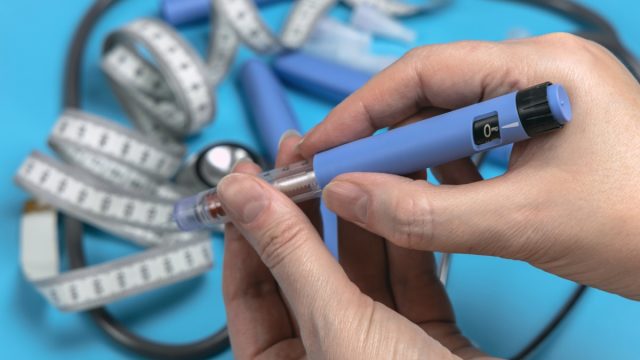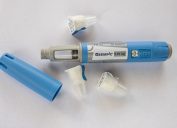Doctor Reveals Surprising New Ozempic Side Effect: "I Noticed Something Really Odd"
Max Pemberton, MRCPsych, didn't expect this when he started on semaglutide.

There's been no shortage of stories about Ozempic side effects, with some patients reporting minor discomfort and others citing pain that landed them in the hospital. Still, the drastic weight-loss results mean the pros outweigh the cons for many—and interestingly enough, not all of the side effects are "bad." Max Pemberton, MRCPsych, a U.K.-based psychiatrist, author, and columnist for the Daily Mail, learned this when he ended up taking Ozempic's sister drug, Wegovy.
RELATED: Ozempic Patients Are Going to the ER Over "Severe" Side Effects.
After he broke his foot, Pemberton was still experiencing pain, prompting his doctor to recommend growth hormone injections, he explains in a piece for the Daily Mail. The growth hormone helped Pemberton walk without limping, he says, but it came "at a cost."
"I developed an insatiable appetite," Pemberton writes. "After a meal, I still felt ravenous, and could eat loaves of bread—yes, plural—as a snack."
While his doctor thought the side effect of the growth hormone would improve, he prescribed semaglutide to help curb Pemberton's cravings in the meantime. Pemberton was put on Wegovy, which is also made by Novo Nordisk and contains semaglutide, the active ingredient in Ozempic. (Wegovy is approved for the treatment of obesity, while Ozempic is a type 2 diabetes drug prescribed off-label for weight loss.)
"I took it for about eight weeks at a low dose and it worked a treat," Pemberton writes. "But then I noticed something really odd. The medication not only stops you feeling hungry (in fact, it makes you feel quite satisfyingly full, even when you've eaten very little), it makes chocolate, cake and other treats seem, well, less of a treat. They just lose their appeal."
But things got even stranger when it came to alcohol. Even though he was not a big drinker to begin with, Pemberton says he lost interest in alcohol while on Wegovy, leaving wine at dinner untouched.
"It simply had no appeal. It's hard to describe, but that little rush of pleasure when you take a sip of alcohol wasn't there. It was like drinking water," he writes in the Daily Mail piece.
He wasn't alone, either. Pemberton says he talked to several friends on the medication who can now "take or leave" a drink, even when they previously enjoyed it.
Other semaglutide users have also taken to TikTok to talk about how alcohol is no longer intriguing to them, including @lilfeofjcorona, who says that it's now a "hard pass." Another TikToker on Ozempic, @myshell26, posted a video saying they have "zero desire to drink."
Speaking with Today.com, Louis Aronne, MD, obesity medicine physician and director of the Comprehensive Weight Control Center at Weill Cornell Medicine and NewYork-Presbyterian, said he's seen a disinterest in alcohol with some patients—but not all.
"In some patients, we'll see a reduction in the urge to drink alcohol and in others that doesn't happen. We don't completely understand why that is," Aronne told the outlet.
RELATED: Ozempic Patient Reveals "Repulsive" New Side Effect.
But studies have looked into this strange side effect. A June 2023 study published in eBioMedicine found that glucagon-like peptide-1 (GLP-1) receptor agonists reduced alcohol intake in rodents and overweight patients diagnosed with alcohol use disorder (AUD). (Semaglutide is a synthetic version of the GLP-1 hormone.)
In his Daily Mail piece, Pemberton highlights another series of case studies published in the Journal of Clinical Psychology in November last year, where patients on Ozempic or Wegovy who had a problem with alcohol reported a reduction in intake. While more studies are needed, researchers suggested these medications could be potential treatments for AUD.
However, the question as to why this happens is a bit more mysterious. According to Pemberton, it's worth noting that GLP-1 medications disrupt the reward pathways in the brain and reduce the release of dopamine, which gives you that rush when you're indulging in a cocktail or a sweet treat.
"This is why foods such as cake and chocolate, which stimulate these pathways, can lose their appeal for people who take one of these drugs," Pemberton explains. "But these reward pathways are also involved in lots of other things, including those relating to addiction and compulsive behaviors like gambling."
In a statement to Best Life, a spokesperson for Novo Nordisk said that aversion to alcohol was not a commonly reported adverse event during clinical development programs of Ozempic, Wegovy, or Rybelsus (a tablet form of semaglutide).
"Therefore [it] is not listed as a potential side effect in the products' prescribing information," the spokesperson said. "Changes in alcohol-related outcomes, like intake, desire, and cravings, were not systematically measured in trials of these products."
Patients who experience side effects while taking these medications should contact their healthcare provider, the spokesperson added.
Best Life offers the most up-to-date information from top experts, new research, and health agencies, but our content is not meant to be a substitute for professional guidance. When it comes to the medication you're taking or any other health questions you have, always consult your healthcare provider directly.





















